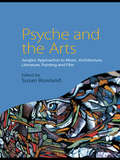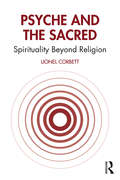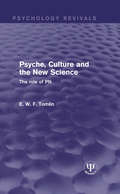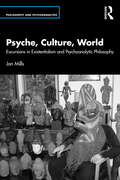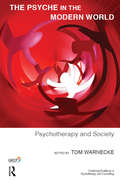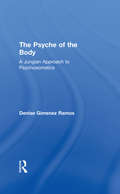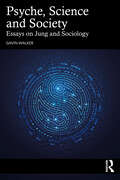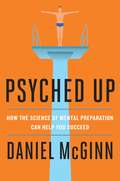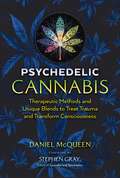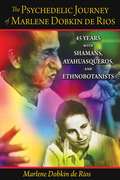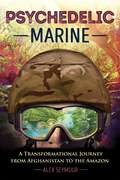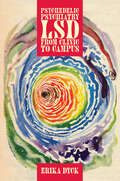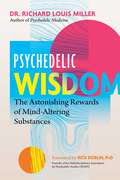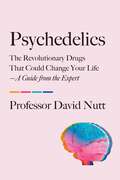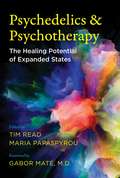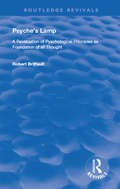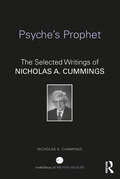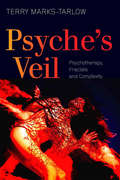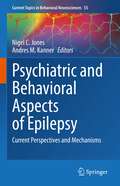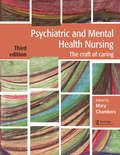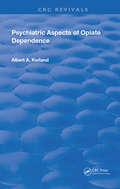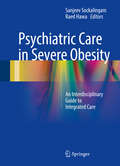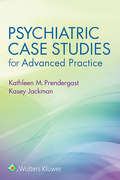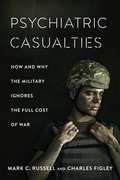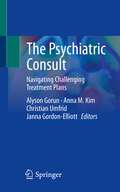- Table View
- List View
Psyche and the Arts: Jungian Approaches to Music, Architecture, Literature, Painting and Film
by Susan RowlandDoes art connect the individual psyche to history and culture? Psyche and the Arts challenges existing ideas about the relationship between Jung and art, and offers exciting new dimensions to key issues such as the role of image in popular culture, and the division of psyche and matter in art form. Divided into three sections - Getting into Art, Challenging the Critical Space and Interpreting Art in the World - the text shows how Jungian ideas can work with the arts to illuminate both psychological theory and aesthetic response. Psyche and the Arts offers new critical visions of literature, film, music, architecture and painting, as something alive in the experience of creators and audiences challenging previous Jungian criticism. This approach demonstrates Jung’s own belief that art is a healing response to collective cultural norms. This diverse yet focused collection from international contributors invites the reader to seek personal and cultural value in the arts, and will be essential reading for Jungian analysts, trainees and those more generally interested in the arts.
Psyche and the Sacred: Spirituality Beyond Religion
by Lionel CorbettThis book presents an approach to spirituality based on direct personal experience of the sacred. Using the language and insights of depth psychology, Corbett outlines the intimate relationship between spiritual experience and the psychology of the individual, unveiling the seamless continuity between the personal and transpersonal dimensions of the psyche. His discussion runs the gamut of spiritual concerns, from the problem of evil to the riddle of pain and suffering. Drawing upon his psychotherapeutic practice as well as on the experiences of characters from our religious heritage, Corbett explores the various portals through which the sacred presents itself to us: dreams, visions, nature, the body, relationships, psychopathology, and creative work. Referring extensively to Jung’s writings on religion, but also to contemporary psychoanalytic theory, Corbett gives form to the new spirituality that is emerging alongside the world’s great religious traditions. For those seeking alternative forms of spirituality beyond the Judeo-Christian tradition, this volume will be a useful guide on the journey.
Psyche, Culture and the New Science: The Role of PN (Psychology Revivals)
by E. W. TomlinOriginally published in 1985, this distinguished and constructive critique of modern culture introduced into our language a brand-new term, ‘PN’, standing for ‘psychic nutrition’, which at the time promised to become a household expression. Drawing on his first-hand knowledge of oriental civilizations; on discoveries of Jung, especially his concept of psychic energy; on the ideas of the cultural anthropologists; and not least on the New Science implicit in microphysics and microbiology, E.W.F. Tomlin, whose philosophical books have been translated into several languages, shows how the human psyche requires its own kind of nourishment just as urgently as the body needs food. In the industrial societies of the West, this need has often been ignored. Reformers, in their earnest though sometimes inept endeavours to create a better world, have too often exposed us to the dangers of psychic starvation and the noxious effects of what may be called ‘neg-PN’. Here lie the roots of violence and the lack of direction so conspicuously afflicting modern man and woman. Examples of PN, positive and negative, are given, lending the book an immediacy and practical character often lacking in studies of this kind. In the new scientific approach here adopted, the divisions between matter and life, and life and mind, are discarded, and the old conflict between science and religion shown to belong to an out-of-date world view. The result is a radical reappraisal of the nature and function of religion and art, the two great psychic forces in history. Indeed, the present crisis is shown to originate in the psychic sphere rather than in the political and economic order. Deeply felt and elegantly written, yet not lacking in wit and humour, the book ends with some concrete ideas on how a more balanced culture may be achieved.
Psyche, Culture, World: Excursions in Existentialism and Psychoanalytic Philosophy (Philosophy and Psychoanalysis)
by Jon MillsAcross the array of topics explored in this comprehensive volume, philosopher and psychoanalyst Jon Mills argues for a fundamental return to the question and meaning of existence. Drawing on the traditions of German Idealism, existentialism, and onto-phenomenology, he offers a rich tapestry of insight and critique into the foundations of psyche, human nature, and society. As a philosophy of mind and culture, psychoanalysis offers us a promising perspective to reengage our being in the world in meaningful ways that illuminate human existence, the mysteriousness of unconscious processes, our relation to transcendence, ethical obligations towards social collectives, and the wonder of logos for our present-day consciousness. After examining the unconscious origins of psychic reality and the contradictory nature of our internal lives, Mills examines the scope of existentialism from antiquity to postmodernism, the question of authenticity, paranoiac epistemology, the essence of evil, dysrecognition and social pathology, belief in God, myth, the ideologies of science, hermeneutics, truth, freedom and determinism, and the fate of civilization in relation to the pervasive forces that threaten our existence. Psyche, Culture, World will be of interest to philosophers, psychoanalysts, psychologists, academics, and students in the arts and humanities, cultural studies, anthropology, myth, psychology of religion, and psychotherapy.
The Psyche in the Modern World: Psychotherapy and Society (The\united Kingdom Council For Psychotherapy Ser.)
by Tom WarneckeThe Psyche in the Modern World sets out to open consulting room doors and bring the concept of the Psyche, and its main advocate, the psychotherapy discipline, into public space and into the realm of interdisciplinary discourse. A culture of carefully guarded clinical confidentialities inadvertently turned the consulting room into a proverbial ivory tower which has done much to obscure the psychotherapeutic body of knowledge and contributed to the myths and misinformation that surround and veil psychotherapy in the public space. This book redresses the balance and confronts some challenging, and sometimes uncomfortable, questions about the dichotomies that both characterize our relationships with the Psyche and contextualize the provision of psychotherapy services today. The contributors present contemporary discussion on a broad range of current subjects, encompassing socio-political as well as philosophical, theoretical and clinical dimensions, in an accessible manner.
The Psyche of the Body: A Jungian Approach to Psychosomatics
by Denise Gimenez RamosThe Psyche of the Body is a passionate and well-informed plea for a Jungian version of psychosomatic medicine and psychotherapy. Illustrated by vivid clinical illustrations of case histories, The Psyche of the Body reviews the long history of psychosomatic medicine and models of the relationship between psyche and body that have evolved over time, and presents a full revision of research in the field over the last twenty years. It presents a much-needed theoretical model together with practical guidelines that demonstrate how the psychological aspects of specific illnesses should be handled in therapy and analysis. Practicing and training Jungian analysts, as well as all those involved in clinical treatment, will find the interdisciplinary approach to psychosomatic medicine promoted in this book fascinating reading.
Psyche, Science and Society: Essays on Jung and Sociology
by Gavin WalkerIn this new volume, Gavin Walker attempts to open a conversation between sociology and Jungian psychology, both often overlooked by each other, through a series of wide-ranging essays. This book provides a Jungian counterpoint to the more accepted Freudian perspective in sociology by engaging with several key themes, including race, gender, urban sociology, religion and the environment. The chapters here consider methodological issues, such as how Jungian psychology might contribute to our understanding of human nature, and Jung’s – and sociology’s – complex and manylevelled relationship with anthropology. As a whole, this unique work provides an open-ended exploration of what sociology includes and excludes from its agenda, and asks how engagement with Jung might shift the centre of gravity of a heterogeneous discipline. Psyche, Science and Society will be of interest to academics and students working in the fields of analytical psychology and sociology, as well as psychoanalysis, anthropology, feminism, environmentalism, comparative religion and the history of science.
Psyched Up: How the Science of Mental Preparation Can Help You Succeed
by Daniel McginnClosing the sale. Asking for a raise. Nailing the big presentation. Of the 2,000 hours you work every year, your success or failure is determined in the couple of dozen crucial hours when you need to bring your absolute best. Will you?The last few minutes before a major challenge can be terrifying. Ever wished you knew how to make sure you ace the make-or-break test, audition, or interview?We often feel the most powerless just before we’re expected to act powerful. As you’ll learn in this life-changing book, practice might make perfect, but perfection is useless if you can’t summon it when it counts. Pulling off a great speech or the pivotal at bat also requires the right kind of mental preparation.In Psyched Up, journalist Daniel McGinn dives into the latest psychological research and interviews athletes, soldiers, entertainers, and others who, despite years of practice and enviable track records, will ultimately be judged on their ability to delivera solid performance when it’s their turn to shine. For instance, he reveals...• How Jerry Seinfeld’s jacket and Stephen Colbert’s pen help them get laughs.• What General Stanley McChrystal said to Special Forces before they entered the battlefield.• Why the New England Patriots hired the DJ from the Red Sox to help them win.Among other counterintuitive insights, McGinn reveals why trying to calm your backstage jitters can be worse for your performance than channeling it into excitement; how meaningless rituals can do more to prepare you in the final moments than last-minute rehearsal; and how a prescription from your doctor could help you unleash your best skills.Whether you’re a sportsperson or a salesperson, an actor or an entrepreneur, one bad hour can throw away months of hard work. There’s so much conflicting popular advice that we often end up doing the wrong things. McGinn separates the facts from the old wives’ tales and shares new, research driven strategies for activating your talent, optimizing your emotions, and getting psyched up to take the spotlight.
Psychedelic Cannabis: Therapeutic Methods and Unique Blends to Treat Trauma and Transform Consciousness
by Daniel McQueen• Explains how cannabis can be used to treat trauma and emotional pain, as a profound problem-solving tool, and as a potent catalyst for self-transformation and ongoing healing work • Shares methods to minimize the unwanted effects, such as intensified anxiety and paranoia, and direct the experience to produce deep physical relaxation and, when needed, elevated healing states • Details how to blend cannabis strains for specific kinds of psychedelic experiences and how to prepare for your sessions to ensure success Despite the recent resurgence of interest in the therapeutic potential of psychedelics, Cannabis sativa as a psychedelic therapy has been completely overlooked. Yet, as psychedelic specialist Daniel McQueen reveals, when used skillfully and with intention, cannabis can be used to treat trauma and other mental health concerns just as psilocybin mushrooms and MDMA can. It can also be used as a problem-solving tool and as a potent catalyst for self-actualization and ongoing healing work. Presenting a step-by-step guide, McQueen explores how to transform cannabis into a reliable and safe psychedelic medicine. Drawing on his years of experience working with clients to release traumas and emotional pain and step into their full potential, he explains the importance of proper dose, set, setting, and intention and details how to prepare for your psychedelic cannabis sessions to ensure success. He shares methods to use cannabis in a specialized and mindful way to minimize unwanted effects, such as intensified anxiety and paranoia, and direct the experience to produce vivid psychedelic states, deep physical relaxation, and healing. Looking at the unique qualities of di erent cannabis strains, the author explores the art of making a psychedelic cannabis blend, the possibilities and hidden potentials of each strain, and how to blend strains for specific medicine experiences, ranging in similarity to MDMA, psilocybin, and even ayahuasca. Unveiling new depth to this ancient spiritual and medicinal ally, McQueen shows how consciously using cannabis as a psychedelic can help transform your trauma into resilience and shift your mindset from surviving to thriving.
The Psychedelic Journey of Marlene Dobkin de Rios: 45 Years with Shamans, Ayahuasqueros, and Ethnobotanists
by Marlene Dobkin de RiosA look inside almost half a century of pioneering research in the Amazon and Peru by a noted anthropologist studying hallucinogens, including ayahuasca • Reveals how ayahuasca successfully treats psychological and emotional disorders • Examines adolescent drug use from a cross-cultural perspective • Discusses the deleterious effects of drug tourism in the Amazon Ayahuasca is an alkaloid-rich psychoactive concoction indigenous to South America that has been employed by shamans for millennia as a spirit drug for divinatory and healing purposes. Although the late Harvard ethnobotanist Richard Evans Schultes was credited in the early 1950s as being the first to document the use of ayahuasca, other researchers, such as the distinguished anthropologist Marlene Dobkin de Rios, were responsible for furthering his findings and uncovering the curative capabilities of this amazing compound. The Psychedelic Journey of Marlene Dobkin de Rios presents the accumulated experience of de Rios’s 45 years of pioneering field studies in the area of hallucinogens in Peru and the Amazon. Her investigation into ayahuasca--which she undertook in collaboration with more than a dozen traditional Mestizo folk curanderos, shamans, and fellow ethnobotanists--focuses on the use of this revolutionary plant in the treatment of recalcitrant psychological and emotional disorders. She also shares some of her theories that prove that the ancient Maya used psychedelic plants as part of their religious rituals, thereby demonstrating the impact of plant psychedelics on human prehistory. In addition, Dobkin de Rios examines altered states of consciousness derived from the use of biofeedback and hypnosis and discusses her current work on the deleterious effects of drug tourism in the Amazon.
Psychedelic Marine: A Transformational Journey from Afghanistan to the Amazon
by Alex SeymourA vivid portrait of both the traumas of war and the shamanic healing ceremonies of ayahuasca• Explains how our culture lacks rites of passage and how shamanic ritual can fill this gap• Reveals how ayahuasca frees your consciousness from inherited beliefs, fears, and traumatic experience, allowing healing from PTSD, alcoholism, and addiction• Details the author’s experiences in Afghanistan, sailing on the Amazon river with a shaman, and the many ayahuasca ceremonies he experienced in the jungleAfter returning from a tour of duty during the war in Afghanistan, Alex Seymour needed a way to cope with the extremes he experienced as a member of the Royal Marine Commandos, losing 7 men in his unit, and having his best friend critically injured by a Taliban bomb. Drawing upon his pre-deployment experiences with DMT and psilocybin mushrooms, Alex knew that entheogens could help him release his fears and traumas. But he also knew that simply taking psychedelics wasn’t enough--he needed ceremony, something sacred to draw meaning from his experiences, to help him reassess not only the war and his role in it, but his entire life. So he set out for the Amazon in search of the hallucinogenic brew known as ayahuasca and a shaman to guide him. The result is a crazy, page-turning adventure where he journeys deep into the jungle and himself.Alex soon finds himself deep within the jungle on an incredible adventure, sailing on the Amazon river with an ayahuasca shaman and his troop of 8 female shamanas, whose ethereal songs help guide participants during the nightly ayahuasca ceremonies. Accompanied by others seeking wisdom and a redemptive experience from their First World professional lives, Alex finds his core beliefs fundamentally challenged, replaced by the power of direct experience of the sacred, which allows him to release his fears from the war and set an inspiring path for the future.Painting a vivid portrait of both the anguish of war and the transcendent world of shamanic ritual, the author shows how young people often enlist in the military to satisfy our human need for a rite of passage into adulthood, a ritual sorely missing in our culture. He explores how ayahuasca can offer a way to help soldiers prepare for war and help combat veterans heal from war and overcome PTSD--as well as alcoholism and addiction. From Afghanistan to the Amazon, the author shows how ayahuasca frees your consciousness from inherited beliefs and fears, offering a truly transformative rite of passage.
Psychedelic Psychiatry: LSD from Clinic to Campus
by Erika DyckLSD's short but colorful history in North America carries with it the distinct cachet of counterculture and government experimentation. The truth about this mind-altering chemical cocktail is far more complex—and less controversial—than generally believed. Psychedelic Psychiatry is the tale of medical researchers working to understand LSD’s therapeutic properties just as escalating anxieties about drug abuse in modern society laid the groundwork for the end of experimentation at the edge of psychopharmacology. Historian Erika Dyck deftly recasts our understanding of LSD to show it as an experimental substance, a medical treatment, and a tool for exploring psychotic perspectives—as well as a recreational drug. She recounts the inside story of the early days of LSD research in small-town, prairie Canada, when Humphry Osmond and Abram Hoffer claimed incredible advances in treating alcoholism, understanding schizophrenia and other psychoses, and achieving empathy with their patients. In relating the drug’s short, strange trip, Dyck explains how concerns about countercultural trends led to the criminalization of LSD and other so-called psychedelic drugs—concordantly opening the way for an explosion in legal prescription pharmaceuticals—and points to the recent re-emergence of sanctioned psychotropic research among psychiatric practitioners. This challenge to the prevailing wisdom behind drug regulation and addiction therapy provides a historical corrective to our perception of LSD’s medical efficacy.
Psychedelic Wisdom: The Astonishing Rewards of Mind-Altering Substances
by Dr. Richard Louis Miller• Reveals how these scientists, doctors, therapists, and teachers have applied their entheogenic experiences in their professions, leading to therapeutic advancements, scientific discoveries, and healing for thousands • Includes contributions from scientific psychonaut Amanda Feilding, psychedelic swami Dr. Allan Ajaya, &“America&’s Doctor&” Dean Edell, convicted psychiatrist Frederike Meckel Fisher, love doctor Charley Wininger, professor of psychedelics Thomas B. Roberts, ethnobotanical explorer Dennis McKenna, the &“Sunshine Makers&” Tim Scully and Michael Randall, as well as many others Over the past decade, many famous entrepreneurs and celebrities have begun to open up about their life-changing experiences with psychedelics that led to their personal successes. But less well-known are the wisdom-bringing psychedelic experiences of many top psychologists, psychiatrists, researchers, and others who have taken what they learned from their entheogenic experiences and applied it in their professions, leading to therapeutic advancements, scientific discoveries, and healing for thousands. In this profound book, Dr. Richard Louis Miller shares stories of psychedelic transformation, insight, and wisdom from his conversations with 19 scientists, doctors, therapists, and teachers, each of whom has been self-experimenting with psychedelic medicines, sub rosa, for decades. We hear from scientific psychonaut Amanda Feilding, founder of the Beckley Foundation; ethnobotanical explorer Dennis McKenna; research advocate and head of MAPS Rick Doblin; and the &“Sunshine Makers&”: Tim Scully, the scientist taught to make LSD by Owsley Stanley, and Michael Randall, the leader of the Brotherhood of Eternal Love. We learn about recasting &“bad trips&” as unfamiliar challenges from psychedelic swami Dr. Allan Ajaya, therapeutic uses of MDMA from &“the love doctor&” Charley Wininger, decades of insights from psychedelic professor Thomas B. Roberts, as well as several others. Revealing the psychedelic wisdom uncovered in spite of decades of the &“War on Drugs,&” Dr. Miller and his contributors show how LSD and other psychedelics offer a pathway to creativity, healing, innovation, and liberation.
Psychedelics: The Revolutionary Drugs That Could Change Your Life—A Guide from the Expert
by Professor David NuttThe definitive guide to the science of psychedelics—"the perfect intro for anyone curious about psychedelics and MDMA&” (Ethan Nadelmann, founder and former executive director, Drug Policy Alliance)--and how they can impact our health by world-renowned, leading authority Professor David Nutt. We are on the cusp of a major revolution in psychiatric medicine and neuroscience. After fifty years of prohibition, criminalization and fear, science is finally showing us that psychedelics are not dangerous or harmful. Instead, when used according to tested, safe and ethical guidelines, they are our most powerful newest treatment of mental health conditions, from depression, PTSD, and OCD to disordered eating and even addiction and chronic pain. Professor David Nutt, one of the world's leading Neuropsychopharmacologists, has spent 15 years researching this field and it is his most significant body of work to date. In 2018, he co-founded the first academic psychedelic research center - underpinned by his mission to provide evidence-based information for people everywhere. It revived interest in the understanding and use of this drug in its many forms, including MDMA, ayahuasca, magic mushrooms, LSD and ketamine. The results of this have been nothing short of ground-breaking for the future categorization of drugs, but also for what we now know about brain mechanisms and our consciousness. At a time where there is an enormous amount of noise around the benefits of psychedelics, this book contains the knowledge you need to know about a drug that is about to go mainstream, free from the hot air, direct from the expert. Are you ready to change your mind?
Psychedelics and Psychotherapy: The Healing Potential of Expanded States
by Tim Read and Maria Papaspyrou• Examines the therapeutic potential of expanded states, underground psychedelic psychotherapy, harm reduction, new approaches for healing individual and collective trauma, and training considerations • Addresses challenging psychedelic experiences, spiritual emergencies, and the central importance of the therapeutic relationship • Details the use of cannabis as a psychedelic tool, spiritual exploration with LSD, micro-dosing with Iboga, and MDMA-assisted psychotherapy for PTSD Exploring the latest developments in the flourishing field of modern psychedelic psycho-therapy, this book shares practical experiences and insights from both elders and newer research voices in the psychedelic research and clinical communities. The contributors examine new findings on safe and skillful work with psychedelic and expanded states for therapeutic, personal, and spiritual growth. They explain the dual process of opening and healing. They explore new approaches for individual inner work as well as for the healing of ancestral and collective trauma. They examine the power of expanded states for reparative attachment work and offer insights on the integration process through the lens of Holotropic Breathwork. The contributors also examine the use of cannabis as a psychedelic tool, spiritual exploration with LSD, microdosing with Iboga, treating depression with psilocybin, and MDMA-assisted psychotherapy for PTSD. Revealing diverse ways of working with psychedelics in terms of set, setting, and type of substance, the book concludes with discussions of ethics and professional development for those working in the field as well as explores considerations for training the next generation of psychedelic therapists.
Psyche's Lamp: A Revaluation of Pyschological Principles as Foundation of All Thought (Routledge Revivals)
by Robert BriffaultOriginally published in 1921, Psyche's Lamp reminds the reader that all thought and discussion, to whatever aspect of confronting problems, social, political, ethical, vital and personal, they may be directed, posit psychological premises. In the darkness and confusion of a human world under reconstrction, where immemorial landmarks lie strewn and buried under the debris of collapsed super-structures, we shall vainly endeavour to thread our way to any purpose unless we can pierce the obscurity by the light of Psyche's lamp.
Psyche's Prophet: The Selected Writings of Nicholas A. Cummings (World Library of Mental Health)
by Nicholas CummingsIn this collection of articles spanning 65 years as a clinical psychologist, Nick A. Cummings selects articles that heralded often far in advance each phase of clinical psychology’s evolution to the present. A pioneer in effecting change, Cummings established the first free-standing professional school of clinical psychology, demonstrated that medical utilization was reduced with psychotherapy, was an early proponent of universal healthcare, fought for the inclusion of psychotherapy in National Health Insurance, established Biodyne, the first private managed care firm for mental health coverage, and battled to maintain psychological services for children against the trend toward medication. This resource will teach not just the history of psychology, but what lies ahead.
Psyche's Veil: Psychotherapy, Fractals and Complexity
by Terry Marks-TarlowHistorically, the language and concepts within clinical theory have been steeped in linear assumptions and reductionist thinking. Because the essence of psychotherapy involves change, Psyche’s Veil suggests that clinical practice is inherently a nonlinear affair. In this book Terry Marks-Tarlow provides therapists with new language, models and metaphors to narrow the divide between theory and practice, while bridging the gap between psychology and the sciences. By applying contemporary perspectives of chaos theory, complexity theory and fractal geometry to clinical practice, the author discards traditional conceptions of health based on ideals of regularity, set points and normative statistics in favour of models that emphasize unique moments, variability, and irregularity. Psyche’s Veil further explores philosophical and spiritual implications of contemporary science for psychotherapy. Written at the interface between artistic, scientific and spiritual aspects of therapy, Psyche’s Veil is a case-based book that aspires to a paradigm shift in how practitioners conceptualize critical ingredients for internal healing. Novel treatment of sophisticated psychoanalytical issues and tie-ins to interpersonal neurobiology make this book appeal to both the specialist practitioner, as well as the generalist reader. .
Psychiatric and Behavioral Aspects of Epilepsy: Current Perspectives and Mechanisms (Current Topics in Behavioral Neurosciences #55)
by Nigel C. Jones Andres M. KannerMany people living with epilepsy also suffer from debilitating psychiatric and cognitive disorders. While these comorbidities have been recognized for centuries, their causation, and relationship to the epilepsy remains clouded in mystery. This volume highlights recent knowledge and findings as well as controversies in our current understanding of behavioral and psychiatric comorbidities of epilepsy.
Psychiatric and Mental Health Nursing: The craft of caring
by Mary ChambersThis new edition of a bestselling, evidence-based textbook provides a comprehensive overview of psychiatric and mental health nursing. Keeping service users and their recovery at the centre of care, the holistic approach will help nurses to gain the tools and understanding required to work in this complex area. Extensively updated for this new edition, the text looks at: Aspects of mental health nursing: covering topics such as ethics, developing therapeutic relationships and supervision. The foundations of mental health nursing: discussing diagnosis, assessment and risk. Caring for those experiencing mental health distress: looking at wide range of troubles including anxiety, bipolar disorder, eating disorders and issues around sexuality and gender. Care planning and approaches to therapeutic practice: exploring ideas, pathways and treatments such as recovery, CBT, psychodynamic therapies and psychopharmacology. Services and support for those with mental health distress: covering topics such as collaborative work, involvement of service users and their families and carers, and a range of different mental healthcare settings. Mental health nursing in the twenty-first century: highlighting emerging and future trends including the political landscape, physical health and health promotion, and technological advances. This accessible and comprehensive textbook integrates service user perspectives throughout and includes student-friendly features such as learning outcomes, key points summaries, reflection points and further reading sections. It is an essential resource for all mental health nursing students, as well as an invaluable reference for practising nurses.
Psychiatric Aspects of Opiate Dependence (Routledge Revivals)
by Albert A. KurlandFirst published in 1978: This book discusses the Psychiatric effects of Opiate dependence.
Psychiatric Care in Severe Obesity
by Sanjeev Sockalingam Raed HawaThis book is designed to present a comprehensive, state-of the-art approach to assessing and managing bariatric surgery and psychosocial care. Unlike any other text, this book focuses on developing a biopsychosocial understanding of patients' obesity journey and psychosocial factors contributing to their obesity and its management from an integrated perspective. Psychiatric Care in Severe Obesity takes a 360 approach by covering the disease's prevalence and relationship to psychiatric illness and social factors, including genetics, neurohormonal pathways and development factors for obesity. This book presents evidence and strategies for assessing psychiatric issues in severe obesity and uses common psychiatric presentations to feature the impact on bariatric surgery and key assessment features for weight loss. Concluding chapters focus on evidence-based psychosocial treatments for supporting patients with weight loss and bariatric surgery and includes educational tools and checklists for assessment, treatment, and care. Experts on non-pharmacological interventions such as mindfulness, cognitive-behavioral therapy and nutrition education describe treatment approaches in each modality, concluding with pharmacological approaches for psychiatric conditions and eating pathology. Additional tools in the appendices support clinicians, making this the ultimate guide for managing psychiatric illness in patients suffering from severe obesity. As obesity continues to grow in prevalence as a medically recognized epidemic, Psychiatric Care in Severe Obesity serves a vital resource to medical students, psychiatrists, psychologists, bariatric surgeons, primary care physicians, dietitians, mental health nurses, social workers, and all medical professionals working with severely obese patients.
Psychiatric Case Studies for Advanced Practice
by Kathleen PrendergastGet much-needed exposure to real-world clinical scenarios and psychiatric evaluations, with this invaluable guide to positive, effective psychiatric advance practice nursing care. For an expert guide to providing patient-centered, evidence-based psychiatric care, keep Psychiatric Case Studies for Advanced Practice by your side. Practical and easy-to-follow, these more than 50 case scenarios clearly display the complaints, diagnoses, and treatments of the most common psychiatric disorders, supporting the critical decision-making skills of nurses practicing in a broad range of settings. Psychiatric, family, emergency, and general practice nurse practitioners of all experience levels will find this an invaluable aid for creating an informed, holistic practice. Follow the real-life cases and expert analysis of psychiatric patients of a wide variety of ages, backgrounds, and conditions . . . Real-world child, adolescent, adult, and geriatric inpatient and outpatient psychiatric case studies that emphasize problem-based learning and an evidence-based practice Current diagnostic content from the Diagnostic and Statistical Manual of Mental Disorders, 5th Edition (DSM-5), that includes DSM-5’s newer diagnoses—gender dysphoria, binge eating disorder, and autism spectrum, plus current treatments for alcohol and opiate addiction Sample routine screening tools that offer convenient checklists and handouts to support patient treatment Content presented in a simple format—organized by age and indexed by diagnostic category for quick reference Each case presented in a standard format: chief complaint, history, mental status, diagnosis, differential diagnosis, treatment plan, and rationale for treatment prescribed—with questions at the end that guide you to create a diagnosis using the DSM-5 Cases addressing a wide range of disorders and supporting all experience levels in a variety of treatment settings—counseling centers, correctional facilities, homeless shelters, inpatient psychiatric units, and hospital consultation and liaison services Treatments and rationales that represent current, evidence-based research—treatment sections divided into psychopharmacology, diagnostic tests, referral, psychotherapy, and psychoeducatio Supplemental teaching tool for graduate psychiatric nurse practitioner/APN programs
Psychiatric Casualties: How and Why the Military Ignores the Full Cost of War
by Professor Mark Russell Professor Charles FigleyThe psychological toll of war is vast, and the social costs of war’s psychiatric casualties extend even further. Yet military mental health care suffers from extensive waiting lists, organizational scandals, spikes in veteran suicide, narcotic overprescription, shortages of mental health professionals, and inadequate treatment. The prevalence of conditions such as post–traumatic stress disorder is often underestimated, and there remains entrenched stigma and fear of being diagnosed. Even more alarming is how the military dismisses or conceals the significance and extent of the mental health crisis.The trauma experts Mark C. Russell and Charles Figley offer an impassioned and meticulous critique of the systemic failures in military mental health care in the United States. They examine the persistent disconnect between war culture, which valorizes an appearance of strength and seeks to purge weakness, and the science and treatment of trauma. Instead of reckoning with the mental health crisis, the military has neglected the needs of service members. It has discharged, prosecuted, and incarcerated a large number of people struggling with the psychological realities of war, and it has inflicted humiliation, ridicule, and shame on many more. Through a far-reaching historical account, Russell and Figley detail how the military has perpetuated a self-inflicted crisis. The book concludes with actionable prescriptions for change and a comprehensive approach to significantly improving military mental health.
The Psychiatric Consult: Navigating Challenging Treatment Plans
by Alyson Gorun Anna M. Kim Christian Umfrid Janna Gordon-ElliottThis book guides psychiatry trainees through some of the most common psychiatric consultation requests in the general medical hospital, using accessible, case-based narratives. Clinical case scenarios are used to demonstrate how to consider both medical and psychological factors involved in the consultation, and the approach to challenging interpersonal dynamics that may occur between the hospitalized patient and the primary medical team. Each case illustrates how to begin to think like a consultation-liaison psychiatrist in order to arrive at a diagnosis and formulate a treatment plan in complex clinical situations. Cases unfold in real time to highlight the critical role of the psychiatrist as liaison to the patient and medical team in order to guide psychiatric management and facilitate effective communication and treatment in the hospital. In addition to clinical cases, each chapter features a concise list of strategies to identify and address patient symptoms and behaviors, interpersonal dynamics, and barriers to care that arise in the hospital. The Psychiatric Consult features resident-specific recommendations and a case-based format that make it a unique, realistic, and engaging learning tool.
